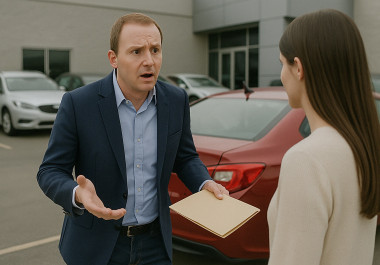If your car has been involved in an accident, then the words ‘write off’ are a classic example of what you don’t want to hear. Now, it’s not necessarily the end of the world, as due to the way that insurance write-offs work, many of these cars remain perfectly driveable. In fact, many of them are just the sort of thing that you can expect to find in our own online vehicle auctions right here at RAW2K. So if your car is written off, and you’re not ready to say goodbye to it just yet, you’ll be happy to hear that there are options for you to challenge it.
How does a car get written off by an insurer?
When your car is involved in an accident, the terms of your insurance contract will generally require you to notify their insurer within 24 hours. The insurer will then have the car professionally assessed at a garage, having checked its trade value using industry sources like Glass’s Guide or Parkers. If the mechanic quotes a price that exceeds more than about 75% of the car’s value, then the insurer will class the car as a financial write-off.
What they’ll do next depends on what kind of write-off it is. We’ve given a more detailed breakdown of the different salvage categories in a previous post, but we’ll recap the basics here too.
Category A and Category B are both classifications that are based on the car’s roadworthiness, so if your car has been assigned one of these titles, then it means your vehicle has suffered such catastrophic damage that it can never be safely made roadworthy again. By law, it has to be entirely scrapped, and neither you nor your insurer have any choice in the matter (although you may be allowed to remove certain valuable parts from a Category B vehicle).
Category C and Category D, on the other hand, are more to do with the car’s financial value. The insurer will make their decision purely based on the cost-benefit analysis of the repairs rather than the car’s roadworthiness, which means that it could even be something relatively minor that’s pushed it over the edge - such as a missing wing mirror, or cosmetic damage to its bodywork.
Once your insurer has decided that it’s a Category C or D write-off, they’ll contact you to offer compensation. This should ideally be roughly equal to the amount that will allow you to buy another car of equal value, but in practice it often tends to be quite a bit lower than that. If you disagree with what you’re being offered, or the fact that the car has been written-off at all, here’s where you have the opportunity to challenge your insurer’s assessment.

How to challenge an insurance write-off
Insurers tend not to make these decisions off-the-cuff, so you’ll need to have a pretty watertight case in order to challenge their findings. That means you’ll need evidence, and lots of it. A good place to start is by doing research on the prices of similar models you can find online or in trader’s magazines, and collecting their details using screenshots or clippings. Don’t forget to take into account the condition and the mileage of your own car though, as that will have an effect on its depreciation.
While you’re doing this, it’s also a good idea to get your own paperwork together, including the service history of your car. Make sure to take into account any modifications or additions, such as any changes you’ve made to infotainment systems, engine capabilities or its bodywork, as these will all have an effect on its value.
It will also really strengthen your case if you’re able to get any professional input from elsewhere. You can ask local dealers for their opinion, and get them to put it in writing if possible. You might also want to consider getting an independent valuation from a member of the Institute of Automotive Engineers. However, don’t forget that they’re not guaranteed to give you the information you want to hear, and it won’t be free either - so you’ll have to weigh up the cost of the assessment against the reward that it’s likely to bring if you’re successful.
Once you’ve got all your evidence together, before you approach the insurance company you’ll need to have decided whether you’re trying to convince them that the car doesn’t deserve to be written off, or whether you accept the write-off but you’re just disputing the amount of money they intend to pay you for it.
If you still want to drive the car
You can’t reverse a write-off decision, as that stays on the car’s history forever. However, you can offer to buy the car back from the insurer and perform the necessary repairs yourself. (If it’s just cosmetic damage or any other damage that has no bearing on its roadworthiness, some drivers opt not to fix it at all.) Lots of people do this if their car has sentimental value.
Don’t forget that your insurance company isn’t obliged to stop a write-off just because you disagree with it, so make sure not to hang around. If you’re too slow to act, you might find that your opportunity to buy back the car has passed.
If you’re disputing the amount
If you accept that the car is being written off, but you’re unhappy about the amount you’re being paid for it, then the most important thing is to know how much more money you want before you take your case to them. Also, don’t forget that your insurer won’t be working from the retail or forecourt price of your car - in other words, what it was worth when it was new - but rather its trade price as it stands right now.

If negotiations stall, or you’re still not happy with the outcome, there is one final nuclear option open to you - the Financial Ombudsman Service. Once again though, you’ll need to act quickly, as the regulations require you to contact them within 6 months of hitting a stalemate with your insurer.
Now, it’s probably worth us saying that most people never get that far, since by that stage the whole process can easily have cost the driver enough money to pay for an entirely new vehicle. What’s more, it doesn’t have to be too difficult to get a replacement, whether you’re a private driver or a fleet manager.
We’ve got plenty to choose from in our own online car auctions right here at RAW2K. Our auctions are refreshed on a daily and weekly basis, so there are always new deals to be had, and we’ve got vehicles from a range of leading manufacturers including Peugeot, Toyota and Vauxhall. Why not take a look around our site, and see what you can find?




